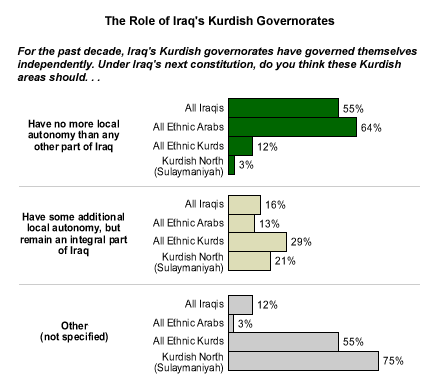The first part of a two-part article on Kurdistan
No one, it seems, wants to see an independent Kurdistan in Iraq -- except, perhaps, a large proportion of the Kurds themselves.
With differing levels of vehemence, Turkey, Iran, and the United States have long opposed the creation of an independent Kurdish state. According to the Gallup Poll of Iraq, the vast majority of Iraqis can be added to that list as well. In the nationwide poll of Iraqi adults, 71% of respondents said the Kurdish areas should have no more local governmental autonomy than any other part of Iraq (55%) or have some additional local autonomy, but remain an integral part of Iraq (16%).
Can a Federal System Bond a Separatist Kurdish North to Iraq?
Following the collapse of Iraq's forces in the Persian Gulf War, one of the primary reasons the coalition gave for not pushing on to Baghdad to oust the Saddam Hussein regime was the fear that the country might cease to exist if a power vacuum were created at its center. While there was concern about a possible civil war between the country's Sunnis and Shiites, an equally likely potential consequence was the declaration of an independent Kurdish state in the north. The prospect of a free Kurdish state might have drawn a military response from neighboring Turkey (Iran, also with a sizable Kurdish minority, viewed this possibility with anxiety as well). However, with the subsequent introduction of a "no-fly zone" in mid-1991, Iraq's three overwhelmingly Kurdish northeastern governorates became self-governing, and have remained so ever since.
Fast forward 13 years. When the deal to produce Iraq's interim constitution nearly collapsed this past February, the last-minute walkout was triggered in part by a provision in the interim Transitional Administrative Law that the country's permanent constitution will not be ratified if two-thirds of the voters in "any three" of the country's 18 governorates reject it. Opponents viewed this provision as an "opt-out" clause for the country's Kurds (who constitute all but a tiny portion of the populations of Sulaymaniyah, Arbil, and Dahuk), and it drew bitter condemnation, particularly from leaders of Iraq's majority Shiite community.
There is little doubt that special care was taken to attract Kurdish support for Iraq's post-Hussein governmental bodies. Though they account for only a small minority of the country's total population (13% of Iraqis live in the three self-governing Kurdish provinces, while roughly 18% of the Iraqi population is ethnically Kurdish), Kurds were amply represented in key positions under the recently devolved Iraqi Governing Council. Its successor, the government to which sovereignty will be given on June 30, will include Kurds serving as deputy president (Rowsch Shaways), deputy prime minister for national security (Barham Salih), and foreign minister (Hoshyar Zebari).
How real is the possibility of an independent Kurdistan? Do Iraq's Kurds really want independence, or simply a high level of autonomy within a federal state? And how do Iraq's ethnic Arabs feel about granting an increased level of autonomy to the country's three northernmost provinces?
Avoiding the "I" Word
Gallup asked Iraqis what status they think the Kurdish provinces that have governed themselves independently since 1991 should have under the country's next constitution. More specifically, Gallup asked whether these provinces should have:
- no more local governmental autonomy than any other part of Iraq
- some additional local autonomy, though remaining an integral part of Iraq
- some other status
The third option was designed to allow for the advocacy of Kurdish independence -- a notion that is nearly taboo to espouse publicly in much of southern Iraq. Interestingly, even the two major political parties that hold sway in Iraq's northeast -- the Kurdistan Democratic Party and the Patriotic Union of Kurdistan -- do not currently advocate full independence, despite the fact that 1.7 million Kurds signed a petition calling for a referendum on this option.
Fifty-five percent of Iraqis overall believe that the areas presently governed by the Kurdish Regional Government should be accorded no more regional autonomy than any other area of the country -- a percentage that rises to nearly two-thirds (64%) among the vast majority of Iraqis who are ethnically Arab. Iraqis thus reject the notion of the region being accorded a special status akin to that which Québec would have received in Canada under the terms of the 1987 Meech Lake Accord (subsequently not ratified) -- a "distinct society," with additional provincial prerogatives under Canada's federal system.
Only 16% of Iraqis think the Kurdish governorates should receive a measure of additional autonomy within Iraq's federal system, and just 12% of Iraqis opt for "some other status" -- the only option that could include support for complete independence.

However, perspectives among Kurdish Iraqis are radically different. A mere 12% of the country's ethnic Kurds believe that the Kurdish governorates should receive no special level of autonomy, and the option of additional autonomy within the Iraqi national system also draws relatively modest support (29%). Instead, 55% of Kurdish respondents chose the "other" option, with many specifically stating they did so as a means of expressing their support for independence.
Assuming Iraqis are willing to allow it a measure of autonomy sufficient to quell any separatist impulse, can Iraq's Kurdish northeast be successfully re-integrated with the remainder of the country? That's the question examined in next week's conclusion.
